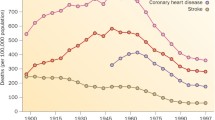Abstract
Diabetes mellitus is a powerful risk factor for cardiovascular disease (CVD), and most persons with diabetes ultimately succumb to coronary artery disease or stroke. The coincidence of hypertension and diabetes is common and, over the long term, sharply increases cardiovascular risk. The incidence of diabetes (new-onset diabetes [NOD]) among hypertensive persons is high, and appears to be increased during antihypertensive therapy. NOD is a distressing clinical event, provoking psychological distress, more clinical testing, and, sometimes, the need for hypoglycaemic therapy. Diuretics and β-blockers are more likely to provoke NOD than other drugs that block the renin angiotensin system, or calcium channel blocking agents, It is important to note that the alternative agents have not been shown to prevent the emergence of hyperglycaemia, but seem to be metabolically neutral. It is also true that because diuretic-induced NOD may be due to hypokalaemia, it can sometimes be reversed without sacrificing diuretic therapy. The evidence suggests that most NOD appearing during antihypertensive therapy is not drug induced, but rather part of the natural history of disease. Since diabetes is such a powerful CVD risk factor, it can hardly be surprising that, over the long term, NOD is associated with increased CVD. However, there is no evidence in short-term clinical trials that diuretic-induced NOD increases CVD or detracts from the cardioprotective effects of these agents. Indeed, long-term follow-up of participants in a large placebo-controlled trial of diuretic therapy in elderly hypertensive subjects suggests that this antihypertensive therapy actually eliminates the expected increase in CVD. In summary, although NOD can hardly be dismissed as a trivial event, concern about its possible occurrence is not a reason to influence initial antihypertensive drug selection, nor does its appearance provide a reason to compromise antihypertensive therapy. Indeed, the available evidence suggests that blood pressure control trumps hypoglycaemic therapy as the very best tool for CVD prevention in new or established diabetic subjects.




Similar content being viewed by others
References
Geiss LS, Herman WH, Smith PJ. Mortality in non-insulin dependent diabetes. In: Diabetes in America. 2nd ed. Bethesda (MD): National Institutes of Health, 1995
Fang J, Alderman MH. Impact of increasing burden of diabetes on acute myocardial infarction in New York City 1990-2000. Diabetes 2006; 55: 768–73
Centers for Disease Control and Prevention. Prevalence of self-reported cardiovascular disease among persons aged >35 years with diabetes — United States 1977–2005. MMWR Morb Mortal Wkly Rep 2007; 56 (43): 1129–32
SHEP Cooperative Research Group. Prevention of stroke by antihypertensive drug treatment in older persons with isolated systolic hypertension: final results of the Systolic Hypertension in the Elderly Program (SHEP). JAMA 1991; 265: 3255–64
The ALLHAT Officers and Coordinators for the ALLHAT Collaborative Research Group. Major outcomes in high-risk hypertensive patients randomized to angiotensin-converting enzyme inhibitor or calcium channel blocker vs diuretic: the Antihypertensive and Lipid-Lowering Treatment to Prevent Heart Attack Trial (ALLHAT). JAMA 2002; 288: 2981–97
DREAM Trial Investigators. Effect of ramipril on the incidence of diabetes. N Engl J Med 2006; 355: 1551–62
Gillespie EL, White CM, Kardas M, et al. The impact of ACE inhibitors or angiotensin II type 1 receptor blockers on the development of new-onset type 2 diabetes. Diabetes Care 2005; 28: 2261–6
Alderman MH, Cohen H, Madhavan S. Diabetes and cardiovascular events in hypertensive patients. Hypertension 1999; 33: 1130–4
Verdecchia P, Reboldi G, Angeli F, et al. Adverse prognostic significance of new diabetes in treated hypertensive subjects. Hypertension 2004; 43: 963–9
Eberly LE, Cohen JD, Prineas R, et al. Intervention Trial Research group. Impact of incident diabetes and incident nonfatal cardiovascular disease on 18-year mortality: the multiple risk factor intervention trial experience. Diabetes Care 2003; 26: 848–54
Almgren T, Wilhelmsen L, Samuelsson O, et al. Diabetes in treated hypertension is common and carries a high cardiovascular risk: results from a 28-year followup. J Hypertens 2007; 25: 1311–7
Aksnes TA, Kjeldsen SE, Rostrup M, et al. Impact of new-onset diabetes mellitus on cardiac outcomes in the Valsartan Antihypertensive Long-Term Use Evaluation (VALUE) trial population. Hypertension 2007; 50: 467–73
Alderman MH, Lamport B. Labelling of hypertensives: a review of the data. J Clin Epidemiol 1990; 43(2): 195–200
Blood Pressure Lowering Treatment Trialists’ Collaboration. Effects of different blood-pressure-lowering regimens on major cardiovascular events: results of prospectively-designed overviews of randomized trials. Lancet 2003; 362: 1527–35
Rowe JW, Tobin JD, Rosa RM, et al. Effect of experimental potassium deficiency on glucose and insulin metabolism. Metabolism 1980; 29: 498–502
Barzilay JI, Cutler JA, Davis BR. Antihypertensive medications and risk of diabetes melelitus. Curr Opin Nephrol Hypertens 2007; 16: 256–60
Kostis JB, Wilson AC, Freudenberger RS, et al. SHEP Collaborative Research Group. Long-term effect of diuretic-based therapy on fatal outcomes in subjects with isolated systolic hypertension with and without diabetes. Am J Cardiol 2005; 95: 29–35
UK Prospective Diabetes Study (UKPDS) Group. Intensive blood-glucose control with sulphonylureas or insulin compared with conventional treatment and risk of complications in patients with type 2 diabetes (UKPDS 33). Lancet 1998; 352: 837–53
Hansson L, Zanchetti A, Carruthers SG, et al. Effects of intensive blood-pressure lowering and low-dose aspirin in patients with hypertension: principal results of the Hypertension Optimal Treatment (HOT) randomized trial. Lancet 1998; 351: 1755–62
Heart Protection Study Collaborative Group. MRC/BHF Heart Protection Study of cholesterol lowering with simvastatin in 20536 high-risk individuals: a randomized placebo-controlled trial. Lancet 2002; 360: 7–22
Acknowledgements
No sources of funding were used to assist in the preparation of this article. The author has no conflicts of interest that are directly relevant to the content of this article.
Author information
Authors and Affiliations
Corresponding author
Rights and permissions
About this article
Cite this article
Alderman, M.H. Is New-Onset Diabetes Mellitus Important?. High Blood Press Cardiovasc Prev 15, 5–8 (2008). https://doi.org/10.2165/00151642-200815010-00002
Received:
Accepted:
Published:
Issue Date:
DOI: https://doi.org/10.2165/00151642-200815010-00002




